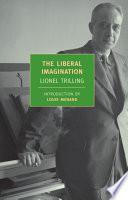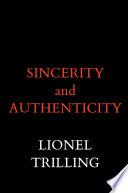Source: Matthew Arnold (1939), Ch. 8: The Failure of the Middle Class
Works

The Liberal Imagination
Lionel Trilling
Sincerity and Authenticity
Lionel TrillingFamous Lionel Trilling Quotes
Notebook entry (1948), published in Partisan Review: 50th Anniversary Edition, ed. William Philips (1985)
The Function of the Little Magazine
The Liberal Imagination (1950)
"Freud: Within and Beyond Culture," Beyond Culture (1965)
Source: Sincerity and Authenticity (1972), p. 64
“George Orwell and the politics of truth,” The Opposing Self (1950), pp. 156-158
The Opposing Self (1950)
Lionel Trilling Quotes about life
Note to the "Criticism" section
The Portable Matthew Arnold (Viking Press, 1949)
“It is now life and not art that requires the willing suspension of disbelief.”
"The Novel Alive or Dead," A Gathering of Fugitives: New Essays (1956)
“George Orwell and the politics of truth,” The Opposing Self (1950), p. 163
The Opposing Self (1950)
Source: Sincerity and Authenticity (1972), p. 123
Lionel Trilling Quotes
The Function of the Little Magazine
The Liberal Imagination (1950)
Context: The writer must define his audience by its abilities, by its perfections, so far as he is gifted to conceive them. He does well, if he cannot see his right audience within immediate reach of his voice, to direct his words to his spiritual ancestors, or to posterity, or even, if need be, to a coterie. The writer serves his daemon and his subject. And the democracy that does not know that the daemon and the subject must be served is not, in any ideal sense of the word, a democracy at all.
Introduction
The allusion to the "tigers of wrath" and "horses of instruction" is from William Blake's The Marriage of Heaven and Hell: Proverbs of Hell
The Portable Matthew Arnold (Viking Press, 1949)
Context: Disgust is expressed by violence, and it is to be noted of our intellectual temper that violence is a quality which is felt to have a peculiarly intellectual sanction. Our preference, even as articulated by those who are most mild in their persons, is increasingly for the absolute and extreme, of which we feel violence to be the true sign. The gentlest of us will know that the tigers of wrath are to be preferred to the horses of instruction and will consider it intellectual cowardice to take into account what happens to those who ride tigers.
"On the Modern Element in Modern Literature," Partisan Review (January/February 1961); reprinted as "On the Teaching of Modern Literature," Beyond Culture (1965)
Context: A real book reads us. I have been read by Eliot's poems and by Ulysses and by Remembrance of Things Past and by The Castle for a good many years now, since early youth. Some of these books at first rejected me; I bored them. But as I grew older and they knew me better, they came to have more sympathy with me and to understand my hidden meanings. Their nature is such that our relationship has been very intimate. No literature has ever been so shockingly personal as that of our time — it asks every question that is forbidden by polite society.
“The factory was not made for man but man for the factory.”
Source: Matthew Arnold (1939), Ch. 8
Context: The doctrines of Calvinism involved a reversal of values with which Arnold became increasingly concerned. Work had always been a curse and a means, but it had now turned into a blessing and an end. The production of goods had become an end in itself and the consumption of goods only the means to further production. The factory was not made for man but man for the factory.
“We have all in some degree become anarchistic.”
Introduction
The Portable Matthew Arnold (Viking Press, 1949)
Introduction
The Portable Matthew Arnold (Viking Press, 1949)
Source: Matthew Arnold (1939), Ch. 12: Resolution
"Elements That Are Wanted," Partisan Review (September/October 1940)
F. Scott Fitzgerald http://fitzgerald.narod.ru/critics-eng/trilling-fsf.html
The Liberal Imagination (1950)
“We are all ill; but even a universal sickness implies an idea of health.”
Art and Neurosis
The Liberal Imagination (1950)
Source: Matthew Arnold (1939), Ch. 11: Joy Whose Grounds Are True
Notebook entry (1951), published in Partisan Review: 50th Anniversary Edition, ed. William Philips (1985)
Manners, Morals and the Novel
The Liberal Imagination (1950)
Introduction
The Portable Matthew Arnold (Viking Press, 1949)
Source: Sincerity and Authenticity (1972), p. 66
Introduction
The Portable Matthew Arnold (Viking Press, 1949)
Introduction
The Portable Matthew Arnold (Viking Press, 1949)
Freud and Literature
The Liberal Imagination (1950)
Notebook entry (1946), published in Partisan Review: 50th Anniversary Edition, ed. William Philips (1985)